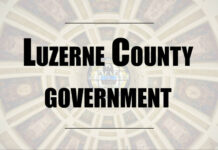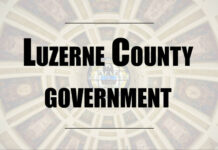Luzerne County will file a two-part legal action Monday to get county council’s election board reconstitution question on the Nov. 7 general election ballot, according to an email county Chief Solicitor Harry W. Skene sent to council Friday night.
As approved by council on Tuesday, the first part of the filing will be a peremptory challenge asking the county Court of Common Pleas to convene a panel to properly frame the home rule charter amendment question or questions.
Council chose to seek this court intervention because the county’s election board did not vote to provide required certification at its Aug. 16 meeting. Instead, the board unanimously agreed to send it back to the county law office for revisions, saying the number of changes warrants eight separate questions instead of one.
The second component of Monday’s filing will seek an alternate action that was not expressly stated when council voted to take the court route. It is a mandamus that would ask the court to order the election board to frame the question/questions and certify the ballot referendum within a specified time period.
It appears this dual-option approach will be deployed in case the court takes a position it should not get involved in convening a panel to approve the question.
Skene’s email said he directed the filing of all causes of action, including a peremptory challenge and mandamus action, to give the court “alternative options to find in our favor.”
“To avoid delay we are moving forward in parallel,” Skene wrote.
Because a mandamus would be filed against the five-citizen election board, the board would be entitled to legal representation from an outside attorney to advocate on the board’s behalf at a hearing.
If the mandamus is granted by the court, the board could be deemed in contempt if it does not comply with the court order and certify the referendum.
“Once the actions are filed the board will have an opportunity to hold a special meeting and approve the question or questions and the plain language notice before the court acts,” Skene wrote.
A plain language statement does not appear on the ballot with a ballot question but is posted at polling places and in legal notices to provide more explanation to voters on proposed changes.
The proposed ballot amendment would revamp the charter section covering the election board and include changes in the way a fifth seat is structured and filled and the eligibility requirements for all board members. It also vacates the currently seated board if the amendment passes.
Time is an issue because Sept. 11 is the target deadline to finalize the general election ballot so it can be proofed and printed for mail ballot voters and programmed into electronic ballot marking devices used at polling places, officials have said.
Skene told council he retained the law firm Joyce, Carmody and Moran to represent the county and file the action. He said this was necessary because the county Office of Law determined a conflict exists with the election board, partially due to court testimony that will be required by two county assistant solicitors — Shannon Crake Lapsansky and Paula Radick.
Crake Lapsansky and Radick both presented legal opinions to the election board at the Aug. 16 meeting before the board decided to send the referendum back to the law office to come up with eight proposed questions.
Under past practice, the county law office would assign an attorney to represent the board.
Board position
Election board members had stated the single question in council’s ballot referendum ordinance and a version proposed by the law office do not sufficiently inform voters of what they would be deciding.
If approved, the charter amendment would:
• Empower council to appoint the fifth election board member of any affiliation instead of leaving that choice up to the four council-appointed members (two Democrats and two Republicans).
• Fill the fifth seat every two years instead of four years.
• Allow the board to select any board member as chair instead of automatically making the member in the fifth seat the chair.
• Vacate the current election board in January.
• Change the retroactive window for board eligibility prohibitions from four years to two years.
• Remove paid election workers from eligibility prohibitions.
• Reduce the continuous political party registration minimum requirement from five years to three years prior to board appointment.
• Omit a current requirement to vacate a board seat if the member files a petition for nomination or election or becomes a candidate for any elective public office.
The state’s referendum handbook says ballot questions cannot exceed 75 words and must be answered with a yes/no response.
“Referenda may be invalidated where the form of the ballot does not conform with the law and is so confusing that voters cannot intelligently express their intentions,” the handbook said.
Council position
The resolution council approved Tuesday said it would petition the county court to appoint county judges or electors to serve instead of the the election board for the purpose of framing the ballot question set forth in council’s ordinance.
According to the resolution:
Council exercised its authority as the governing body to place a charter amendment question on the ballot. Under state law, the election board has the power to “frame the question that is to be placed on an election ballot.”
At its public meeting Aug. 16, the election board, “after being instructed of their legal requirement to do so, ignored the edicts of” the council ordinance and state law and “refused to either frame the charter amendment ballot question and/or place the referendum on the ballot.”
The election board “has no legal authority to refuse to frame a charter amendment question for the ballot and/or refuse to place the charter amendment referendum on the ballot as directed by Luzerne County Council.”
It also said there is “an inherent conflict of interest with the board’s involvement with the home rule charter amendment referendum.”
“Board members have specifically publicly referenced how adoption of the proposed charter amendment would negatively impact themselves personally including during the Aug. 16, 2023 board meeting while acting as board members,” it said.
Instead of going to court, county Councilman Stephen J. Urban unsuccessfully advocated a different option to rescind the referendum ordinance and remove the referendum from the November ballot.
Reach Jennifer Learn-Andes at 570-991-6388 or on Twitter @TLJenLearnAndes.




